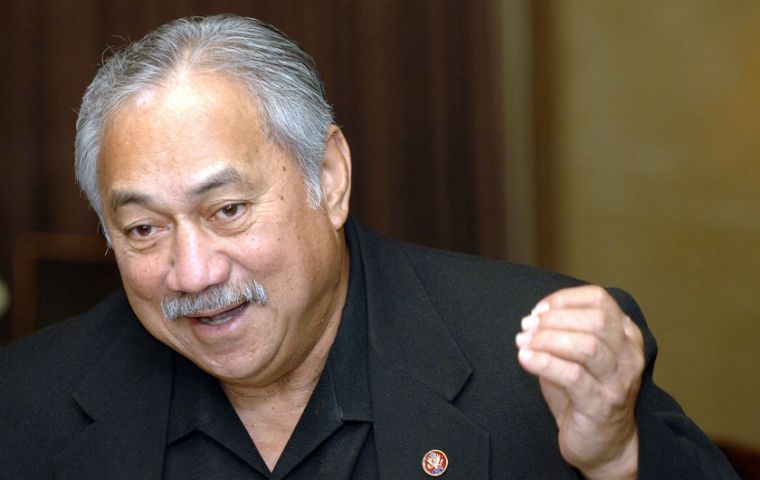MercoPress. South Atlantic News Agency
US Congressman to assess Easter Island conflict between Rapa Nui natives and Chile
 Faleomavaega is a member of the US House Committee on Foreign Affairs and the House Committee on Natural Resources
Faleomavaega is a member of the US House Committee on Foreign Affairs and the House Committee on Natural Resources The United States congressman representing the territory of American Samoa has announced he will be traveling to Easter Island during the Congressional recess to assess recent developments between the legitimate representatives of the Rapa Nui clans and the Chilean government.
“Conflict between the Rapa Nui natives and the Chilean government has existed since 1888 when Chile signed a disputed treaty with the Rapa Nui people” said US Representative Eni F.H. Faleomavaega said.
Easter Island, or its Polynesian name of Rapa Nui, is one of the world’s most isolated inhabited islands.
Congressman Faleomavaega has been representing the territory of American Samoa in the United States Congress since 1989. Re-elected in November, 2010 to a twelfth term by the people of American Samoa, Faleomavaega is the longest serving and only Samoan in the U.S. Congress.
Faleomavaega is a member of the House Committee on Foreign Affairs and the House Committee on Natural Resources
“At that time, Chile took control of the island and confined the Rapa Nui people to a small area of land, approximately one square mile”.
“In 1933, Chile leased the remaining land to private sheep-herding enterprises and took ownership of all untitled lands. In 1966, Chile passed a law which authorized the President to grant land titles to the Rapa Nui people and prohibited the transfer of lands to non-indigenous individuals. However, land was illegally privatized and sold to mainland Chileans during the Pinochet Dictatorship.”
“Today non-indigenous individuals and corporations possess most of the land, and the Chilean government continues to favor private companies interested in exploiting the Rapa Nui culture for private gain instead of restoring the land to the Rapa Nui people. Within the past five months, Chilean armed forces have been carrying out forced evictions of Rapa Nui natives.”
“In a letter dated February 3, 2011, U.S. Senator Daniel Akaka and I wrote to the President of the Republic of Chile, His Excellency Sebastian Piñera, expressing our deepest concerns about the current situation unfolding in Easter Island and, in response to that letter, I have since met with Ambassador Arturo Fermandois of the Republic of Chile and he has assured me that he is committed to a productive exchange of views and welcomes my visit to Rapa Nui,” the Congressman said.
“I will be traveling to Rapa Nui in my capacity as the Ranking Member of the Foreign Affairs Subcommittee on Asia and the Pacific and also as a Member of the House Foreign Affairs Subcommittee on the Western Hemisphere. Prior to my arrival in Rapa Nui, the Government of Chile will be arranging a series of meetings for me in Santiago with Minister of Foreign Affairs Alfredo Moreno, Minister of Planification Felipe Kast, Undersecretary for Regional Development Miguel Flores, and Special Advisor for Indian Affairs (SEGPRES) Sebastian Donoso. While in Easter Island, the Rapa Nui Parliament is arranging meetings with Governor Carmen Cardinali, Mayor Luz Sasso, the Municipal Council, the Elders Council, the MakenuRe’o Rapa Nui women’s organization, the Development Commission and other interested parties.”
“I am pleased by these developments and, once more, I thank Ambassador Arturo Fermandois for making this visit possible and arranging this itinerary. I also thank the Rapa Nui Parliament for its assistance. It is my sincere hope that President Obama will support the indigenous rights of the Rapa Nui people during his planned visit to Chile this week since the United States should be a leader in promoting democracy and human rights. I also hope that the government of Chile will be responsive and allow for the people of Rapa Nui to live in peace on their land,” Faleomavaega concluded.




Top Comments
Disclaimer & comment rules-

-

-

Read all commentsThe elephant in the room is (again) the UN Committee on Decolonization.
Mar 24th, 2011 - 12:09 pm 0US Representative Eni F.H. Faleomavaega represents American Samoa - another Territory that is threatened by compulsory partition from a Protecting State.
Faleomavaega is viewing Easter Island, where the 'Protecting State' has removed indigenous defacto ownerships (the large majority of the island area) and re-allocated the bulk of the landmass to individuals/organizations from the 'Protecting State', Chile.
I LIKE the American Samoa's submission papers to the Decolonization Committee:
The core argument is SELF-DETERMINATION, and, if the indigenous small island community WISHES to remain within the ambit of the protectorate, the wishes of the people should be paramount.
And, in the case of Easter Island, if the indigenous population wish to regain rights of ownership from a foreign country that removed them - that is also a paramount wish of the people on this albeit largely 'recently' depopulated island.
As an aside, Easter Island is given sheep by Chile - what it really needs is TREES.
Indigenous population: Rapa Nui
Mar 25th, 2011 - 01:27 am 0As opposed to implanted colonists: British population on Malvinas
Oh, Martin,
Mar 25th, 2011 - 01:59 pm 0you KNOW there was no indigenous people when the Falkland Islands were discovered - any of the times!
Geoff.
Commenting for this story is now closed.
If you have a Facebook account, become a fan and comment on our Facebook Page!